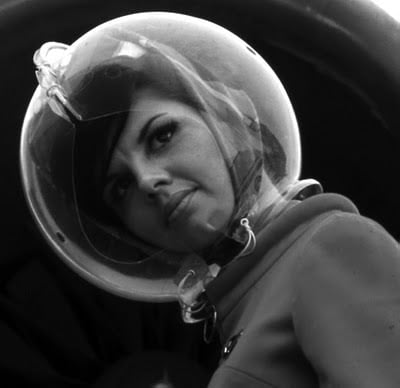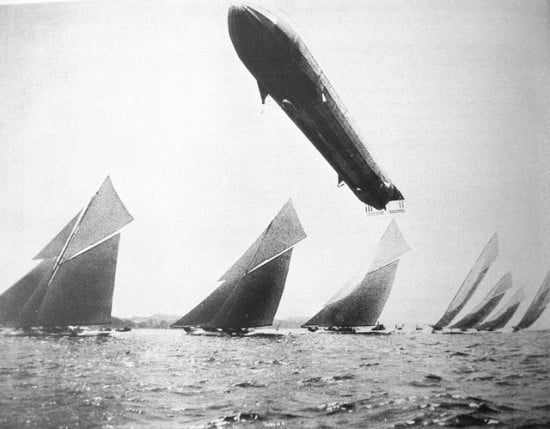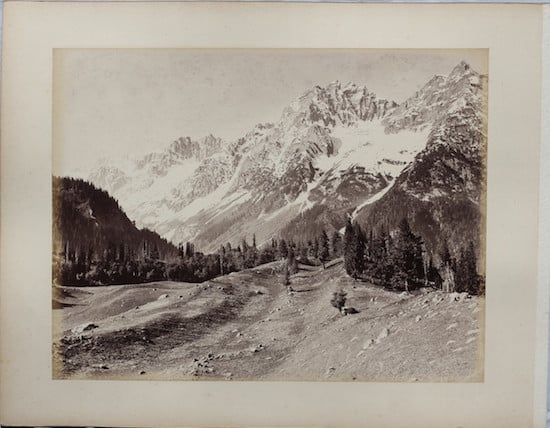The Machine Stops (4)
By:
August 7, 2015

HiLoBooks is pleased to serialize E.M. Forster’s 1909 novella The Machine Stops. Published between the author’s much more famous works A Room With A View and Howards End, science fiction scholars remind us that The Machine Stops predicted the Internet and instant messaging… as well as a WALL-E-type dystopia.
Doubtless the Committee was right. Yet the attempt to “defeat the sun” aroused the last common interest that our race experienced about the heavenly bodies, or indeed about anything. It was the last time that men were compacted by thinking of a power outside the world. The sun had conquered, yet it was the end of his spiritual dominion. Dawn, midday, twilight, the zodiacal path, touched neither men’s lives not their hearts, and science retreated into the ground, to concentrate herself upon problems that she was certain of solving.
So when Vashti found her cabin invaded by a rosy finger of light, she was annoyed, and tried to adjust the blind. But the blind flew up altogether, and she saw through the skylight small pink clouds, swaying against a background of blue, and as the sun crept higher, its radiance entered direct, brimming down the wall, like a golden sea. It rose and fell with the air-ship’s motion, just as waves rise and fall, but it advanced steadily, as a tide advances. Unless she was careful, it would strike her face. A spasm of horror shook her and she rang for the attendant. The attendant too was horrified, but she could do nothing; it was not her place to mend the blind. She could only suggest that the lady should change her cabin, which she accordingly prepared to do.

People were almost exactly alike all over the world, but the attendant of the air-ship, perhaps owing to her exceptional duties, had grown a little out of the common. She had often to address passengers with direct speech, and this had given her a certain roughness and originality of manner. When Vashti swerved away from the sunbeams with a cry, she behaved barbarically — she put out her hand to steady her.
“How dare you!” exclaimed the passenger. “You forget yourself!”
The woman was confused, and apologized for not having let her fall. People never touched one another. The custom had become obsolete, owing to the Machine.
“Where are we now?” asked Vashti haughtily.
“We are over Asia,” said the attendant, anxious to be polite.
“Asia?”
“You must excuse my common way of speaking. I have got into the habit of calling places over which I pass by their unmechanical names.”
“Oh, I remember Asia. The Mongols came from it.”
“Beneath us, in the open air, stood a city that was once called Simla.”
“Have you ever heard of the Mongols and of the Brisbane school?”
“No.”
“Brisbane also stood in the open air.”
“Those mountains to the right — let me show you them.” She pushed back a metal blind. The main chain of the Himalayas was revealed. “They were once called the Roof of the World, those mountains.”

“You must remember that, before the dawn of civilization, they seemed to be an impenetrable wall that touched the stars. It was supposed that no one but the gods could exist above their summits. How we have advanced, thanks to the Machine!”
“How we have advanced, thanks to the Machine!” said Vashti.
“How we have advanced, thanks to the Machine!” echoed the passenger who had dropped his Book the night before, and who was standing in the passage.
“And that white stuff in the cracks? — what is it?”
“I have forgotten its name.”
“Cover the window, please. These mountains give me no ideas.”
The northern aspect of the Himalayas was in deep shadow: on the Indian slope the sun had just prevailed. The forests had been destroyed during the literature epoch for the purpose of making newspaper-pulp, but the snows were awakening to their morning glory, and clouds still hung on the breasts of Kinchinjunga. In the plain were seen the ruins of cities, with diminished rivers creeping by their walls, and by the sides of these were sometimes the signs of vomitories, marking the cities of today. Over the whole prospect air-ships rushed, crossing the inter-crossing with incredible aplomb, and rising nonchalantly when they desired to escape the perturbations of the lower atmosphere and to traverse the Roof of the World.
“We have indeed advanced, thanks to the Machine,” repeated the attendant, and hid the Himalayas behind a metal blind.

The day dragged wearily forward. The passengers sat each in his cabin, avoiding one another with an almost physical repulsion and longing to be once more under the surface of the earth. There were eight or ten of them, mostly young males, sent out from the public nurseries to inhabit the rooms of those who had died in various parts of the earth. The man who had dropped his Book was on the homeward journey. He had been sent to Sumatra for the purpose of propagating the race. Vashti alone was travelling by her private will.
At midday she took a second glance at the earth. The air-ship was crossing another range of mountains, but she could see little, owing to clouds. Masses of black rock hovered below her, and merged indistinctly into grey. Their shapes were fantastic; one of them resembled a prostrate man.
“No ideas here,” murmured Vashti, and hid the Caucasus behind a metal blind.
In the evening she looked again. They were crossing a golden sea, in which lay many small islands and one peninsula. She repeated, “No ideas here,” and hid Greece behind a metal blind.
RADIUM AGE SCIENCE FICTION: “Radium Age” is HILOBROW’s name for the 1904–33 era, which saw the discovery of radioactivity, the revelation that matter itself is constantly in movement — a fitting metaphor for the first decades of the 20th century, during which old scientific, religious, political, and social certainties were shattered. This era also saw the publication of genre-shattering writing by Edgar Rice Burroughs, Sax Rohmer, E.E. “Doc” Smith, Jack London, Arthur Conan Doyle, Aldous Huxley, Olaf Stapledon, Karel Čapek, H.P. Lovecraft, Charlotte Perkins Gilman, Yevgeny Zamyatin, Philip Gordon Wylie, and other pioneers of post-Verne/Wells, pre-Golden Age “science fiction.” More info here.
READ GORGEOUS PAPERBACKS: HiLoBooks has reissued the following 10 obscure but amazing Radium Age science fiction novels in beautiful print editions: Jack London’s The Scarlet Plague, Rudyard Kipling’s With the Night Mail (and “As Easy as A.B.C.”), Arthur Conan Doyle’s The Poison Belt, H. Rider Haggard’s When the World Shook, Edward Shanks’ The People of the Ruins, William Hope Hodgson’s The Night Land, J.D. Beresford’s Goslings, E.V. Odle’s The Clockwork Man, Cicely Hamilton’s Theodore Savage, and Muriel Jaeger’s The Man with Six Senses. For more information, visit the HiLoBooks homepage.
SERIALIZED BY HILOBOOKS: Jack London’s The Scarlet Plague | Rudyard Kipling’s With the Night Mail (and “As Easy as A.B.C.”) | Arthur Conan Doyle’s The Poison Belt | H. Rider Haggard’s When the World Shook | Edward Shanks’ The People of the Ruins | William Hope Hodgson’s The Night Land | J.D. Beresford’s Goslings | E.V. Odle’s The Clockwork Man | Cicely Hamilton’s Theodore Savage | Muriel Jaeger’s The Man With Six Senses | Jack London’s “The Red One” | Philip Francis Nowlan’s Armageddon 2419 A.D. | Homer Eon Flint’s The Devolutionist | W.E.B. DuBois’s “The Comet” | Edgar Rice Burroughs’s The Moon Men | Charlotte Perkins Gilman’s Herland | Sax Rohmer’s “The Zayat Kiss” | Eimar O’Duffy’s King Goshawk and the Birds | Frances Hodgson Burnett’s The Lost Prince | Morley Roberts’s The Fugitives | Helen MacInnes’s The Unconquerable | Geoffrey Household’s Watcher in the Shadows | William Haggard’s The High Wire | Hammond Innes’s Air Bridge | James Branch Cabell’s Jurgen | John Buchan’s “No Man’s Land” | John Russell’s “The Fourth Man” | E.M. Forster’s “The Machine Stops” | John Buchan’s Huntingtower | Arthur Conan Doyle’s When the World Screamed | Victor Bridges’ A Rogue By Compulsion | Jack London’s The Iron Heel | H. De Vere Stacpoole’s The Man Who Lost Himself | P.G. Wodehouse’s Leave It to Psmith | Richard Connell’s “The Most Dangerous Game” | Houdini and Lovecraft’s “Imprisoned with the Pharaohs” | Arthur Conan Doyle’s “The Sussex Vampire.”
ORIGINAL FICTION: HILOBROW has serialized three novels: James Parker’s The Ballad of Cocky The Fox (“a proof-of-concept that serialization can work on the Internet” — The Atlantic); Karinne Keithley Syers’s Linda Linda Linda (which includes original music); and Robert Waldron’s roman à clef The School on the Fens. We also publish original stories and comics. These include: Matthew Battles’s stories “Gita Nova“, “Makes the Man,” “Imago,” “Camera Lucida,” “A Simple Message”, “Children of the Volcano”, “The Gnomon”, “Billable Memories”, “For Provisional Description of Superficial Features”, “The Dogs in the Trees”, “The Sovereignties of Invention”, and “Survivor: The Island of Dr. Moreau”; several of these later appeared in the collection The Sovereignties of Invention | Peggy Nelson’s “Mood Indigo“, “Top Kill Fail“, and “Mercerism” | Annalee Newitz’s “The Great Oxygen Race” | Flourish Klink’s Star Trek fanfic “Conference Comms” | Charlie Mitchell’s “A Fantasy Land” | Charlie Mitchell’s “Sentinels” | Joshua Glenn’s “The Lawless One”, and the mashup story “Zarathustra vs. Swamp Thing” | Adam McGovern and Paolo Leandri’s Idoru Jones comics | John Holbo’s “Sugarplum Squeampunk” | “Another Corporate Death” (1) and “Another Corporate Death” (2) by Mike Fleisch | Kathryn Kuitenbrouwer and Frank Fiorentino’s graphic novel “The Song of Otto” (excerpt) | John Holbo’s graphic novel On Beyond Zarathustra (excerpt) | “Manoj” and “Josh” by Vijay Balakrishnan | “Verge” by Chris Rossi, and his audio novel Low Priority Hero | EPIC WINS: THE ILIAD (1.408-415) by Flourish Klink | EPIC WINS: THE KALEVALA (3.1-278) by James Parker | EPIC WINS: THE ARGONAUTICA (2.815-834) by Joshua Glenn | EPIC WINS: THE MYTH OF THE ELK by Matthew Battles | TROUBLED SUPERHUMAN CONTEST: Charles Pappas, “The Law” | CATASTROPHE CONTEST: Timothy Raymond, “Hem and the Flood” | TELEPATHY CONTEST: Rachel Ellis Adams, “Fatima, Can You Hear Me?” | OIL SPILL CONTEST: A.E. Smith, “Sound Thinking | LITTLE NEMO CAPTION CONTEST: Joe Lyons, “Necronomicon” | SPOOKY-KOOKY CONTEST: Tucker Cummings, “Well Marbled” | INVENT-A-HERO CONTEST: TG Gibbon, “The Firefly” | FANFICTION CONTEST: Lyette Mercier’s “Sex and the Single Superhero”
